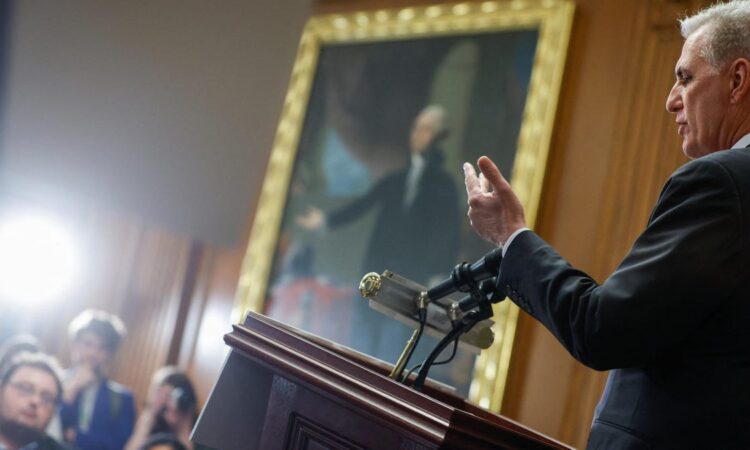
The bipartisan deal to raise the debt limit exists in a protean grey space in the discourse: It’s a compromise, so people dislike it, and as it awaited votes in Congress, Democrats attempted not to claim too large a win for fear of scaring off their counterparty.
Now that the deal is headed to US president Joe Biden’s desk, we can evaluate what the outcome actually means for the economy. In short, the agreement solves a problem the US shouldn’t have faced in the first place, puts some limits on a small chunk of government spending, and makes some policy changes that range from largely rhetorical to simply common-sense.
What does the debt ceiling deal actually do?
Start with expectations: House Republicans had threatened to allow a debt default if US discretionary spending wasn’t cut by $330 billion in the next two years. The final deal between Biden and Republican speaker of the House Kevin McCarthy will cut discretionary spending by $170 billion in that period. (The first two years are most important, since the 2024 election could upend control of Washington in either direction.)
Given the surge in spending since the pandemic, elevated inflation, and that Republicans won control of the House of Representatives, some kind of spending cuts were a given. The White House’s own budget actually envisioned top-line cuts on a deeper scale than the final deal.
For comparison, look at the budget deal Republicans forced in 2011 under similar political circumstances. Discretionary spending actually fell for four straight years, as opposed to rising more slowly than forecast, as it does under this agreement.
Still, the all-important divvying up of funding for programs will emerge from future acrimonious Congressional negotiations. And notably, for the substance-oriented, this deal doesn’t do anything that would actually improve the US debt situation in even the medium term: That would require raising revenues and addressing the healthcare costs that drive long-term spending growth.
More work requirements, fewer environmental ones
Other provisions in the bill (pdf) don’t do much but give Republican politicians a ready line for the campaign trail. Work requirements added to programs that provide food to the poor and assistance to low-income families with children are limited. Surprisingly, budget analysts predict the changes to government food assistance will actually lead to more enrollees and spending; although advocates for food assistance say those projections are unrealistic.
Meanwhile, cutting the IRS budget by $1.4 billion doesn’t save money because revenue collections will decrease. In any case, the reduction is small compared to the $80 billion in funding enacted in 2022.
There’s also a package of changes to the US law governing environmental reviews of large projects like renewable power plants, natural gas plants, and even spaceports. Environmental reviews have been blamed for holding up both renewable power and fossil fuel infrastructure, so both parties adopted some long-discussed reforms, like limiting environmental reviews to two years.
Plans to make the US electrical grid friendlier to renewable energy by building long-distance power lines weren’t included in the deal, however, leaving some environmentalists fuming that the Biden administration missed its chance to enact those reforms.
One big missed opportunity
The lack of any real drama around the debt ceiling was a relief, but it also sets up another opportunity down the line for Republicans to threaten a default and economic calamity rather than endure traditional budget talks.
If we didn’t already know it, now it bears repeating: The debt ceiling is an archaic fixture of US government that isn’t supposed to drive public priority setting.
There was hope that the Biden White House would repudiate the inherent constitutional conflict in the limit through any number of possible mechanisms: the 14th amendment, high-coupon bonds, or even the platinum coin. But the administration insisted it would do none of those things, and some despaired that it was giving up its limited leverage.
The 2011 deal, both due to the economic crisis that preceded it and the spending it cut, contributed to an anemic recovery from the 2008 recession. This time around, though the negotiations were costly, at least there wasn’t a market crash to tip the US into a recession. So that’s a big win.
Fair play to Biden the dealmaker—it seems even the GOP couldn’t bear to kill its hostage, the US economy. But it won’t be long before we’re talking about all this again.






